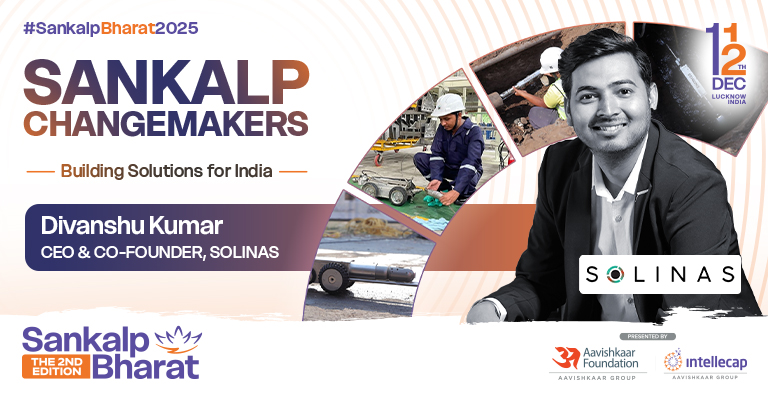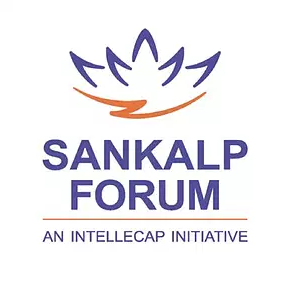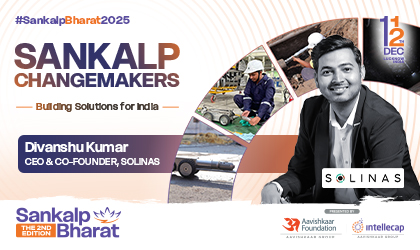

Robots, sewers, and the fight for human dignity – #SankalpChangemakers features Divanshu Kumar, CEO and Co-Founder of Solinas Integrity
The Engineering of Dignity
When Divanshu Kumar first pitched his septic-tank cleaning robot at IIT Madras, he thought he had all the right answers. The presentation wove together sleek slides, technical diagrams, and won praise from university professors. But then came the humansintheroom moment.
After the presentation, sanitation workers burst into laughter. Their simple question hit him like a shockwave: “Have you ever seen a manhole being cleaned? At midnight?” They described their work – the smell, the physical strain, the indignity – as nothing like what the team had imagined.
Kumar admitted later that these early reactions forced him to reconsider what he thought he knew. “We hadn’t seen the real world yet,” he said in a later interview.
By some estimates, over 340 individuals have died in India from cleaning sewers and septic tanks manually since 2017. Despite legislation banning manual scavenging, it persists, often in the dark corners of cities where visibility, both literal and political, is low.
The Turn from Prototype to Product
In 2018, Divanshu co-founded Solinas Integrity alongside two co-founders. The company, based in Chennai, now builds robotic and AI-based solutions for water and sanitation infrastructure. Its three main products – HomoSEP, EndoBot, and Swasth AI – target different gaps in civic infrastructure. HomoSEP is a septic tank cleaner that can reduce human intervention; EndoBot is a crawler robot for pipeline inspection and defect mapping; and Swasth AI provides predictive maintenance analytics for municipalities.
The company has deployed its systems in over 15 Indian cities, including Chennai, Aurangabad, and Sangli. It has also worked with private players like L&T and Suez to integrate its technology into larger water and sanitation projects.
The Market and the Margin for Error
Solinas’s approach is rooted in two assumptions: one, that cities are willing to invest in safer, smarter sanitation; and two, that robotic systems can be cost-effective at scale. So far, the bet is still playing out.
In FY24, Solinas reported revenues of approximately ₹4.5 crore, while still operating at a loss (₹2.8 crore EBITDA). The company expects to reach ₹15 crore in revenue by FY25. Its financials are modest, especially compared to well-funded tech peers, but reflect a willingness to stay focused on a narrow problem that few others are addressing.
The deep-tech startup has so far raised over $1M in funding (grant & equity) from investors like Social Alpha, 8X Ventures, Rainmatter, and Neev Fund
Engineering Meets Policy
India’s Jal Jeevan Mission, which aims to provide tap water to every rural household has opened a window for startups like Solinas. As infrastructure expands, so too does the need for maintenance, inspection, and data collection. Solinas fits into this maintenance layer.
But it still faces hurdles common to civic-tech startups: inconsistent regulatory support, resistance from legacy contractors, and infrastructure that varies wildly from city to city. What works in Chennai might not in Kanpur. Pipes are older, drains narrower, and procurement fragmented.
To navigate this, Solinas works directly with on-ground sanitation workers to iterate its hardware. In some deployments, it trains workers to use the devices, shifting the narrative from “robots replacing jobs” to “robots reducing risk.”
“We’re not trying to automate out people,” Kumar has said in interviews. “We’re trying to eliminate the worst part of the job.”
The Real Impact? Still a Work in Progress
For all the accolades—engineering awards, features on television, startup ecosystem support—there’s a quiet caution in Kumar’s tone. Solinas is not yet a scaled solution. It’s an early attempt. The impact so far is specific and local, not yet systemic.
Still, its deployments have measurable results. In Hubli, robotic cleaning led to restored water access in a slum settlement after two years of contamination. In Aurangabad, the company helped prevent potential water loss of several hundred thousand litres by identifying pipeline defects early.
But perhaps the clearest measure of progress is not litres saved or contracts signed. It’s whether one more worker does not have to enter a septic tank.
What This Tells Us About Building for Bharat
In a space where most startups chase scale through the cloud, Solinas is waist-deep in the ground, both literally and metaphorically. It operates in messy, bureaucratic systems. It deals with municipal procurement and long feedback loops. Its tech requires physical deployment, maintenance, and local trust.
But it’s also where the opportunity lies.
Sanitation infrastructure in India remains underfunded, manually managed, and high-risk. If even a fraction of it can be automated or made safer, the ripple effects on public health, water quality, and worker safety are hard to ignore.
Divanshu Kumar spoke at the Sankalp Bharat Summit 2024 in Varanasi, where he emphasized that scaling solutions for infrastructure in India means designing for complexity, not for simplicity. His was one of several voices highlighting the need to build innovation inside legacy systems, not outside them.




